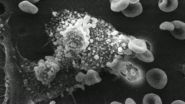(Press-News.org) (Boston) – When it comes to treating infants with neonatal abstinence syndrome (NAS), researchers from Boston University School of Medicine (BUSM) believe the care for these infants should be consistent and objective, with standardized assessment tools and evidence to back up pharmacologic and nonpharmacologic treatment choices.
The review paper, which is published online in Addiction Science & Clinical Practice, highlights the need for more research in this field to optimize care for both infants and their mothers.
NAS is a collection of signs and symptoms infants can develop after birth following exposure to drugs in utero. These can include gastrointestinal, respiratory, autonomic and central nervous system disturbances from opioid withdrawal that affect critical regulatory areas after birth. According to a recent study in JAMA, the incidence of infants with NAS has increased over the past 10 years.
The initial development of the NAS assessment using a type of scoring system began in the 1970s and was considered a turning point in the care of infants with opioid exposure since pediatricians recognized the need for a consistent way of assessing exposure. The "Finnegan Score" (FS) was developed and is still widely used by observers seeking common signs of opioid withdrawal. Above a certain threshold, infants are started on pharmacologic therapies. However, since initial inception, the FS has been modified and used differently across institutions.
"We found that the data are limited to guide physician assessment and management of these infants and said lead author Sarah Bagley, MD, an addiction medicine fellow at BUSM and a physician in General Internal Medicine at Boston Medical Center.
The authors also highlight that nonpharmacologic interventions, including breastfeeding, may decrease the severity of NAS symptoms.
"We need more research in order to develop consistent criteria for physicians that will guide them in their treatment decisions, which can include medication and nonpharmacologic interventions," added Bagley.
INFORMATION:
Funding for this research was provided in part by the National Institute on Drug Abuse under grant award numbers R25DA03211 and R25DA013582.
BUSM researchers find NAS treatment needs standardization
2014-09-25
ELSE PRESS RELEASES FROM THIS DATE:
Fecal microbiota transplantation recommended for treatment of C. difficile
2014-09-25
(Vienna, October 26, 2014) The transplantation of faecal microbiota from a healthy donor has been shown in recent clinical studies to be a safe and highly effective treatment for recurrent Clostridium difficile (C. difficile) infection and is now recommended in European treatment guidelines.1,2 Faecal microbiota transplantation (FMT) has emerged as a revolutionary, potentially life-saving treatment for this common, difficult-to-treat infection, and is showing promise in the management of other microbiota-related conditions.3,4
Presenting at the 22nd United European Gastroenterology ...
In the face of uncertainty, the brain chooses randomness as the best strategy
2014-09-25
AUDIO:
Editor Karen Carniol interviews Dr. Alla Karpova on her latest Cell paper.
Click here for more information.
Past experience is usually a reliable guide for making decisions, but in unpredictable and challenging situations, it might make more sense to take risks. A study published by Cell Press September 25th in the journal Cell shows that, in competitive situations, rats abandon their normal tactic of using past experience to make decisions and instead make random choices ...
How the brain gains control over Tourette syndrome
2014-09-25
Tourette syndrome is a developmental disorder characterized by involuntary, repetitive, and stereotyped movements or utterances. Now researchers reporting in the Cell Press journal Current Biology on September 25 have new evidence to explain how those with Tourette syndrome in childhood often manage to gain control over those tics. In individuals with the condition, a portion of the brain involved in planning and executing movements shows an unusual increase compared to the average brain in the production of a primary inhibitory neurotransmitter known as GABA.
The paradoxical ...
Modified vitamin D shows promise as treatment for pancreatic cancer
2014-09-25
VIDEO:
Salk scientists find that a vitamin D-derivative makes tumors vulnerable to chemotherapy.
Click here for more information.
LA JOLLA—A synthetic derivative of vitamin D was found by Salk Institute researchers to collapse the barrier of cells shielding pancreatic tumors, making this seemingly impenetrable cancer much more susceptible to therapeutic drugs.
The discovery has led to human trials for pancreatic cancer, even in advance of its publication today in the journal ...
How physical exercise protects the brain from stress-induced depression
2014-09-25
Physical exercise has many beneficial effects on human health, including the protection from stress-induced depression. However, until now the mechanisms that mediate this protective effect have been unknown. In a new study in mice, researchers at Karolinska Institutet in Sweden show that exercise training induces changes in skeletal muscle that can purge the blood of a substance that accumulates during stress, and is harmful to the brain. The study is being published in the prestigious journal Cell.
"In neurobiological terms, we actually still don't know what depression ...
Brain chemical potential new hope in controlling Tourette Syndrome tics
2014-09-25
A chemical in the brain plays a vital role in controlling the involuntary movements and vocal tics associated with Tourette Syndrome (TS), a new study has shown.
The research by psychologists at The University of Nottingham, published in the latest edition of the journal Current Biology, could offer a potential new target for the development of more effective treatments to suppress these unwanted symptoms.
The study, led by PhD student Amelia Draper under the supervision of Professor Stephen Jackson, found that higher levels of a neurochemical called GABA in a part ...
Super enhancers in the inflamed endothelium
2014-09-25
Boston, MA – Normally, the lining of blood vessels, or endothelium, when at rest, acts like Teflon, ignoring the many cells and other factors rushing by in the bloodstream. In response to inflammatory signals, as well as other stimuli, endothelial cells change suddenly and dramatically—sending out beacons to attract inflammatory cells, changing their surface so those cells can stick and enter tissues, and initiating a complex cascade of responses essential to fighting infection and dealing with injury. Unfortunately, these same endothelial responses also promote atherosclerosis, ...
Novel compound prevents metastasis of multiple myeloma in mouse studies
2014-09-25
BOSTON –– In an advance against the problem of cancer metastasis, Dana-Farber Cancer Institute scientists have shown that a specially developed compound can impede multiple myeloma from spreading to the bones in mice. The findings, published in the Sept. 25 issue of Cell Reports, suggest the technique can protect human patients, as well, from one of the most deadly aspects of cancer.
The research involves a new approach to the challenge of cancer metastasis, the process by which tumors spread to and colonize distant parts of the body. Whereas research has traditionally ...
Dinosaur family tree gives fresh insight into rapid rise of birds
2014-09-25
The most comprehensive family tree of meat-eating dinosaurs ever created is enabling scientists to discover key details of how birds evolved from them.
The study has shown that the familiar anatomical features of birds – such as feathers, wings and wishbones – all first evolved piecemeal in their dinosaur ancestors over tens of millions of years.
However, once a fully functioning bird body shape was complete, an evolutionary explosion began, causing a rapid increase in the rate at which birds evolved. This led eventually to the thousands of avian species that we know ...
Strategic or random? How the brain chooses
2014-09-25
Many of the choices we make are informed by experiences we've had in the past. But occasionally we're better off abandoning those lessons and exploring a new situation unfettered by past experiences. Scientists at the Howard Hughes Medical Institute's Janelia Research Campus have shown that the brain can temporarily disconnect information about past experience from decision-making circuits, thereby triggering random behavior.
In the study, rats playing a game for a food reward usually acted strategically, but switched to random behavior when they confronted a particularly ...


